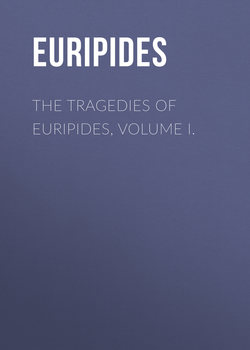Читать книгу The Tragedies of Euripides, Volume I. - Euripides - Страница 11
HECUBA
HECUBA
FEMALE ATTENDANT, CHORUS, HECUBA
ОглавлениеATT. O attendants, where, I pray, is the all-wretched Hecuba, who surpasses the whole race of man and woman kind in calamities? no one shall wrest from her the crown.
CHOR. But what dost thou want, O wretch, in thy words of ill omen? for thy messages of woe never rest.
ATT. I bring this grief to Hecuba; but in calamity 'tis no easy thing for men to speak words of good import.
CHOR. And see, she is coming out of the house, and appears in the right time for thy words.
ATT. O all-wretched mistress, and yet still more wretched than I can express in words, thou art undone, and no longer beholdest the light, childless, husbandless, cityless, entirely destroyed.
HEC. Thou has said nothing new, but hast reproached me who already know it: but why dost thou bring this corse of my Polyxena, whose sepulture was reported to me as in a state of active progress through the labors of all the Grecians?
ATT. She nothing knows, but, woe's me! laments Polyxena, nor does she apprehend her new misfortunes.
HEC. O wretched me! dost bring hither the body of the frantic and inspired Cassandra?
ATT. She whom thou mentionedst, lives; but thou dost not weep for him who is dead; but behold this corse cast naked [on the shore,] and look if it will appear to thee a wonder, and what thou little expectest.
HEC. Alas me! I do indeed see my son Polydore a corse, whom (I fondly hoped) the man of Thrace was preserving in his palace. Now am I lost indeed, I no longer exist. Oh my child, my child! Alas! I begin the Bacchic strain, having lately learned my woes from my evil genius.
ATT. Thou knowest then the calamity of thy son, O most unfortunate.
HEC. I see incredible evils, still fresh, still fresh: and my immeasurable woes follow one upon the other. No longer will a day without a tear, without a groan, have part with me.
CHOR. Dreadful, oh! dreadful are the miseries that we endure!
HEC. O child, child of a wretched mother, by what fate art thou dead, by what hap liest thou here? by the hand of what man?
ATT. I know not: on the wave-washed shore I found him.
HEC. Cast up from the sea, or fallen by the blood-stained spear? (Note19.)
ATT. The ocean's billow cast him up from the deep on the smooth sand.
HEC. Woe is me! Now understand I the dream, the vision of mine eyes; the black-winged phantom has not flitted by me in vain, which I saw concerning thee, my child, as being no longer in the light of day.
CHOR. But who slew him? canst thou, O skilled in dreams, declare him?
HEC. My friend, my friend, who curbs the steed in Thrace, where his aged father placed him for concealment.
CHOR. Ah me! what wilt thou say? Was it to possess his gold that he slew him!
HEC. Unutterable deeds, unworthy of a name, surpassing miracles, unhallowed, insufferable! Where are the laws of hospitality? O most accurst of men, how didst thou mar that skin, how sever with the cruel sword the poor limbs of this boy, nor didst feel pity?
CHOR. O hapless woman, how has the deity made thee by far the most wretched of mortals, whoever he be that presses heavy on thee! But, my friends, let us henceforward be silent, for I see our lord Agamemnon advancing.
19
Dindorf disposes these lines differently, but I prefer Porson's arrangement, as follows:
ΕΚ. εκβλητον, η πες. φ. δορος;
ΘΕΡ. εν ψαμαθωι λευραι
ποντου νιν, κ.τ.λ.
